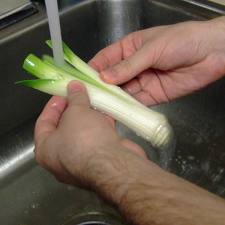Potato and leek soup is a standard in my kitchen, using chicken stock made from the weekly roast chicken.
I’m not sure what else leeks are used for, and they can contribute to some fantabulous gas, but they are a mess to clean: dirt and soil is engrained throughout the white part of the vegetable. I give them a rinse under tap water and then slice for soup. But the risk is with cross- contamination – leeks are grown in soil and whatever microorganisms are within the white bits are going to drip on the counter and elsewhere.
contamination – leeks are grown in soil and whatever microorganisms are within the white bits are going to drip on the counter and elsewhere.
Be the bug, follow the bug.
The folks at the U.K. Food Standards Agency whose idea of science-based verification is to cook meat until it is piping hot, have apparently decided that E. coli O157:H7 – the dangerous kind – found on or in leeks, is the consumers’ responsibility.
Almost two months after revealing 250 people were sickened and one died with E. coli O157:H7 phage-type 8 over the previous eight months, linked to people handling loose raw leeks and potatoes in their homes, FSA has today launched a new campaign reminding people to wash raw vegetables to help minimize the risk of food poisoning.
No information on how 250 became sick over six months and the public wasn’t told, no information on farming and packing practices that may have led to such a massive contamination that so many people got sick, no information on anything: just advice to wash things thoroughly so that contamination can be spread throughout the kitchen.
Today’s FSA announcement says, “The campaign is in response to E. coli outbreaks in Britain and abroad this year including one linked to soil on raw vegetables and another caused by contaminated sprouted seeds.”
Washing sprouts does nothing, especially if the contamination is within the seed, as it most likely was in the E. coli O104 outbreak in Europe earlier this year.
The campaign messages include:
• always wash hands thoroughly before and after handling raw food, including vegetables;
• keep raw foods, including vegetables, separate from ready-to-eat foods;
 • use different chopping boards, knives and utensils for raw and ready-to-eat foods, or wash thoroughly in between preparing different foods; and,
• use different chopping boards, knives and utensils for raw and ready-to-eat foods, or wash thoroughly in between preparing different foods; and,
• unless packaging around vegetables says ‘ready-to-eat’ you must wash, peel or cook them before consuming.
Consumers, you are the critical control point for microorganisms that will rip out your kidneys. And you’ll be paying for the PR campaign to tell you to do better.
